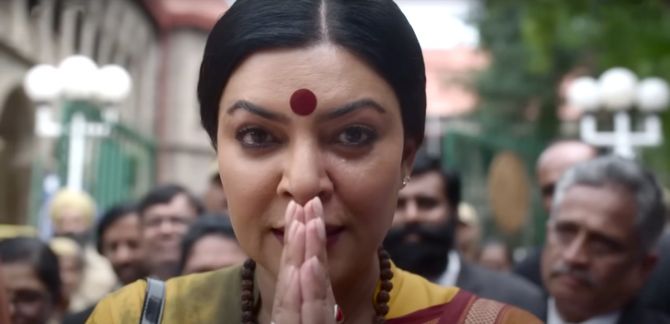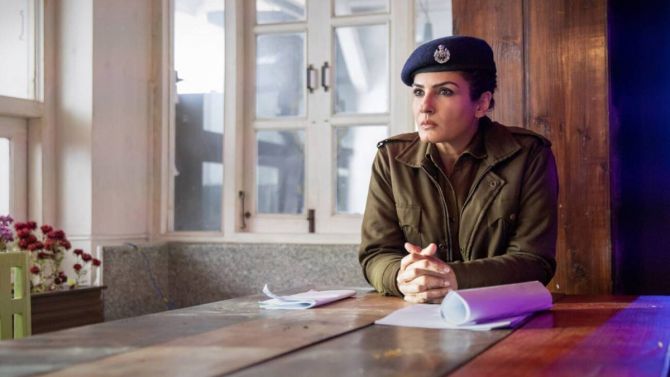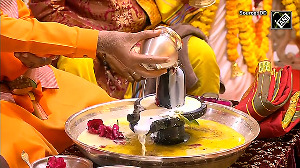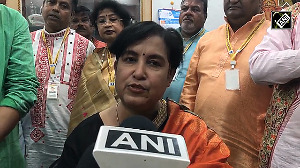'If OTT platforms had not come in, we would not get this second lease of life.'

Tip Tip Barsa Paani, the popular rain song, first appeared on screen in the 1994 film, Mohra. It appeared again in 2021's Sooryavanshi.
Barring some remixing, the two songs are the same.
They have the same tune, the same singers (Udit Naryaan and Alka Yagnik), the same hook-step, and the same male lead, Akshay Kumar, who plays a cop in both the movies.
The difference is that the female lead in the Mohra song is Raveena Tandon, who made her film debut in 1991.
The Sooryavanshi version has Katrina Kaif, who, according to Internet databases, is 12 to 13 years junior to Tandon.
A long-time Bollywood watcher says that is the lot of the leading ladies, and recounts Raakhee's story.
Well-regarded for her acting skills, Raakhee played Amitabh Bachchan's love interest in 1981's Barsaat Ki Ek Raat and, a year later, his mother in Shakti. (She also played Bachchan's mother in 1981's Laawaris, but her character died young and mother and son are not seen together.)
From Shakti onwards, Raakhee graduated to playing mostly older, more mature characters, occasionally summoning her sons (Ram-Lakhan, Karan-Arjun) to wreak their vengeance.
Perhaps it was time for Tandon to move on to playing mother or bhabhi (older sister-in-law), except that she won't succumb to the Raakhee syndrome.
Her big-screen career had gone off the boil after 2004's Dobara, but she made a strong comeback with Aranyak.
The Netflix show was her streaming debut and received rave reviews for her portrayal of a police officer investigating a murder in a hill town.
In her younger days, when Tandon played romantic leads, she drew more attention for her looks than acting chops.
Tandon was part of the bunch of women who ruled Hindi film screens in the 1990s, alongside Madhuri Dixit, who debuted in 1984 but supplanted Sridevi at the top in the 1990s, Juhi Chawla, Kajol, Karisma Kapoor, Aishwarya Rai, and Manisha Koirala.
Just below them on the ladder of success were Sushmita Sen and Sonali Bendre.
All of them either took a break from acting or just faded this century.
But each, except Rai, has made roaring comebacks -- on streaming or over-the-top platforms (OTT), as they are called because they ride on top of the existing Internet infrastructure.
The latest to debut on OTT is Kajol, in The Trial, which dropped in July.
In this innings, the queens of the nineties are playing meatier roles that are -- as in Tandon's case -- far removed from their screen image in the 1990s.
And they are earning plaudits for their performances, not just for their looks or dance moves.

Sushmita Sen, for instance, had a lukewarm movie career and soon found herself doing second leads and, later, item songs.
These days, she is in the news for portraying the role of real-life transgender activist Gauri Sawant, who was born Ganesh.
Sen, who underwent angioplasty in March, told Press Trust of India: 'Earlier, it used to be the greatest tragedy, when an actor or actress reached this age, their careers were long finished, but this is when they know how to bring it to real life. This is the time to be an actor.'
When Bendre landed up on the sets of The Broken News, her streaming debut, she was astonished.
The camera used to be a big element when she made her movie debut. Now, it is so small it can sneak up on you.
Striking as that imagery is, this is not the only change.
'If OTT platforms had not come in, we would not get this second lease of life,' Bendre said during a chat on Film Companion's YouTube channel.

According to one industry player, the nineties women are back in business because they remain recognisable faces and appeal to audiences who were watching movies in the 1990s.
At the same time, with the erosion of their movie market value, they are available for reasonable fees.
"They are what one would call 'value buys'," says the industry insider, who does not want to be named for the fear that this might be construed as disrespectful.
That is one way of looking at it. Another is to consider a streaming platform's need to have an inexhaustible storehouse of content that can keep a viewer in its fold forever -- every day, if possible.
"The best content strategy for a mainstream streaming platform in India is to serve people a thaali, with a dish of as many genres as possible, from crime to romance to thriller, and also subjects that would appeal to several age groups," says Anish Chandy, founder of Labyrinth Literary Agency, which has so far been involved in more than 110 deals to convert books into movies and Web series.
"For that they need a large number of shows, which require several actors with different public images as well as vintage," adds Chandy.

The big OTTs, such as Netflix, Prime Video, and Jio, also have enormous budgets.
One rarely gets the breakdown of the money spent on and revenues earned from individual shows, but industry buzz says the budget for a high-profile series could easily be between Rs 60 crore (Rs 600 million) and Rs 100 crore (Rs 1 billion).
That is comparable with movies, though the revenue models are starkly different.
For a movie releasing in hundreds of screens, there is no build-up like there used to be before the multiplex boom, when a film would start up in select cities and gradually roll out to others.
Now, movies hit nearly every PIN code on the same day.
Its fate gets decided on the first weekend -- there is no build-up and definitely no turnaround after a slow start.

A high-profile streaming show, even if it debuts on number one -- the big ones usually do -- its blockbuster weekend would be far leaner than a movie's opening.
However, platforms own the rights to a show in perpetuity and a successful show can turn into a gift that keeps on giving for years.
In certain cases, such as the cult show, Friends, which ended 19 years ago, the returns can keep coming over decades.
Besides, streaming platforms have a healthy dose of multinational professionalism (thanks to Netflix, Prime Video and Disney+) and familiarity with female actors such as Kate Winslet who continue to hold sway over the box office.
In fact, Tandon's police officer in Aranyak evokes shades of Winslet's cop in Mare of Easttown, a notable success for HBO.
In contrast, the legacy Hindi movie business, which could not wait to nudge female actors to move on, has still not fully embraced professionalism.
Yes, swathes of it are now corporatised, but even well-known producers are not loath to turn to astrologers for advice.
In an industry where fortunes are made and destroyed every weekend, a bit of Divine intervention never goes amiss.
The women on OTT, on the other hand, are taking matters into their own hands.
Feature Presentation: Aslam Hunani/Rediff.com












 © 2025
© 2025